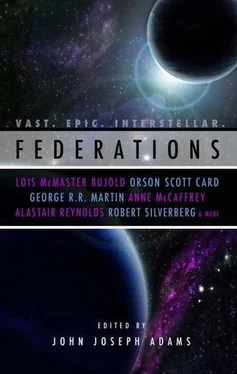I stay angry for a long time. The pilots don’t know what they’re talking about.
Yemennis do nothing by mistake.
• • •
Alpha was the most skilled diplomat on the planet.
They don’t say so in the documentary; they talk about how kind she is and how smart she is and how she looks like a mix of everyone, and if you just listened to what they were saying you’d think she hardly deserved to go. There were a lot of people in line; astronauts and prime ministers and bishops all clamoring for the privilege.
And she got herself picked—she got picked above every one of them; she was the most skilled diplomat who ever lived. She could work out anything, I bet.
• • •
There’s an engineer down five levels who looks good to me, is smart enough, and we get married. We have two kids. (Someone will have to watch over the Yemennis when I’m gone, someone with my grandfathers’ talents for calibrating a needle; we’ve been six generations at Wren Yemmeni’s side.)
We celebrate four hundred years of peace. All the delegates put a message together, to be played in every ship, for the civilians. For some of them, it’s the first they’ve heard of the other languages. Everyone on the ship, twelve thousand strong, watches raptly from the big hangar and the gymnasium level, from the tech room and the bridge.
They go one by one, and I recognize our reception room as the camera pans from one face to another. They talk about peace, about their home planets, about how much they look forward to all of us knowing the message, when Carthage comes.
Wren Octa-Yemenni goes last.
“I hope that, as we today are wiser today than we were, so tomorrow we will be wiser than we are,” she says. Dorado 216 looks like he wants to slap her.
She says, “I hope that when our time comes to meet Carthage, we may say that we have fulfilled the letter and spirit of its great message, and we stand ready for a bright new age.”
Everyone in the tech room roars applause (Yemennis know how to talk to a crowd). Just before the video shuts off, it shows all the delegates side by side; Octa is looking out the window, towards something none of us can see.
• • •
One night, a year before she’s due to be expired, I find Octa in the development room. She’s watching the tube where Ennea is gestating. Ennea’s almost grown, and it looks like Octa’s staring at her own reflection.
“Four hundred years without a war,” she says. “All of us at a truce, talking and learning. Waiting for Carthage.”
“Carthage will come,” I promise, glancing at Ennea’s pH readout.
“I hope we don’t see it,” she says, frowns into the glass. “I hope, when it comes, all of us are long dead, and better ones have taken their places. Some people twist on themselves if you give them any time at all.”
Deka and Hendeka are in tubes behind us, smaller and reserved, eyes closed; they’re not ready. We won’t even need them until I’m dead. Though it shouldn’t matter, I care less for them than I do for Ennea, less than I do for Octa, who’s watching me.
Octa, who seems to think none of them are worthy of Carthage at all. She’s been losing faith for years.
None of these copies are like Alpha. They all do their duty, but she believed .
• • •
At the fifty-year mark, Octa comes in to be expired.
She hands over the recording device, and the government guys disappear to their level to put together the memory flux for Ennea, who will wake up tonight and need to know.
“You shouldn’t keep doing this,” she tells me as we help her onto the table and adjust the IV.
There are no restraints. The Yemennis don’t balk at what they have to do; duty is in their bones. But Octa looks sad, even sadder than when she found out that the one before her had loved someone who was already dead.
“It’s fine,” I say. “It’s the best way—one session of information, and she’s ready to face Carthage.”
“But she won’t remember something if I don’t record it? She won’t know?”
Octa’s always been a little edgy—I try to sound reassuring. “No, she won’t feel a thing. Forget Dorado. There’s nothing to worry about.”
Octa looks like she’s going to cry. “What if there’s something she needs to know?”
“I’ll get you a recorder,” I say, and start to hold up my hand for the sound tech, but she shakes her head and grabs my sleeve.
I drop my arm, surprised. No one else has even noticed; they’re already starting the machines to wake up the next one, and Octa and I might as well be alone in the room.
After a second she frowns, drops my hand, makes fists at her sides like she’s holding back.
The IV drips steadily, and around us everyone is laughing and talking, excited. They seem miles away.
Octa hasn’t stopped watching me; her eyes are bright, her mouth drawn.
“Have you seen the message?”
She must know I haven’t. I shake my head; I hold my breath, wondering if she’s going to tell me. I’ve dreamed about it my whole life, wondering what Alpha knew that made her cry with joy, four hundred years ago.
“It’s beautiful,” she says, and her eyes are mostly closed, and I can’t tell if she’s talking to me or just talking. The IV is working; sometimes they say things.
She says, “I don’t know how anyone could take up a weapon again, after seeing the message.”
Without thinking, I put my hand over her hand.
She sighs. Then, so quietly that no one else hears, Octa says, “I hope that ship never comes.”
Her face gets tight and determined—she looks like Alpha, exactly like, and I almost call out for them to stop—it’s so uncanny, something must be wrong.
But nothing is wrong. She closes her eyes, and the bio-feed flatlines; the tech across the room turns off the alarm on the main bank, and it’s over.
We flip on the antigrav, and one of the techs takes her down to the incinerator. He comes back, says the other delegates have lined up in the little audience hall outside the incinerator, waiting to clap and drink champagne.
It’s always a long night after an expiration, but it’s what we’re here to do, and it’s good solid work, moving and monitoring and setting up the influx for Yemenni’s first night. Nobody wants a delay between delegates. You never know when the Carthage is going to show up. We think another four hundred years, but it could be tomorrow. Stranger things have happened.
Wren Ennea-Yemenni needs to be awake, just in case; she’ll have things to do, when Carthage comes.
LIFE-SUSPENSION
by L. E. Modesitt, Jr.
L. E. Modesitt is the bestselling author of the Saga of Recluse , the Spellsong Cycle , the Corean Chronicles , and several other series, as well as a number of standalone novels, such as The Eternity Artifact , The Elysium Commission , and a new book, Haze , that’s due out in June. His short fiction has appeared in a number of anthologies, and was recently collected in Viewpoints Critical.
“Life-Suspension” is set in a future where interstellar travel is possible, but where there is warfare over who controls the lines of interstellar communication. “It’s a story that shows how thin the lines between all human passions are, especially in war,” Modesitt said. “I was a military pilot, and I’ve tried to capture the feel of those situations, and the contrast between the times of action and the quiet civility of officers in between action.”
The S.R.S. Amaterasu had left Kunitsu Orbit Station 2 less than three hours earlier, and Flight Captain Ghenji Yamato was more than ready to eat when the junior officers’ wardroom opened at 1600 KMT. He wasn’t the first entering—that would have been most impolite—but he was far from the last when he took his seat halfway down the second table.
Читать дальше












